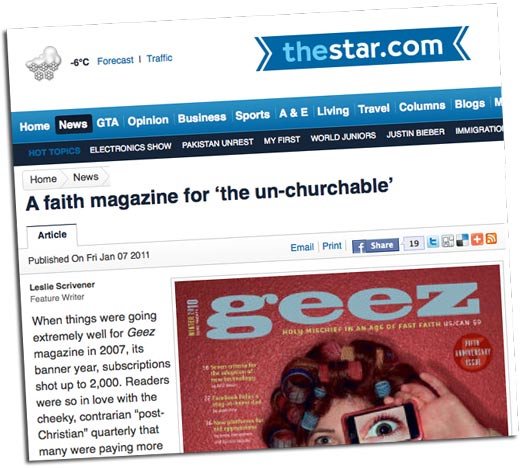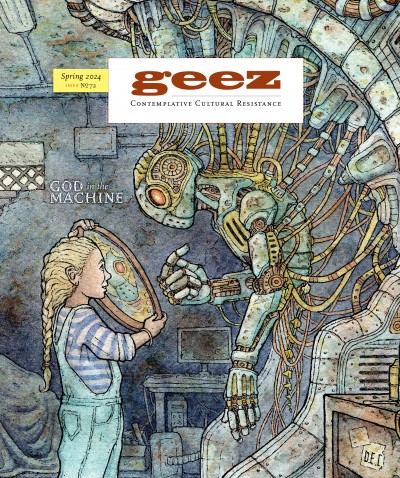Press
A faith magazine for ‘the un-churchable’

When things were going extremely well for Geez magazine in 2007, its banner year, subscriptions shot up to 2,000. Readers were so in love with the cheeky, contrarian “post-Christian” quarterly that many were paying more than the annual $35 subscription to ensure its survival.
One subscriber has sent the magazine $100 a month since 2008.
You’d think that an editor would be on his knees in gratitude to this donor, since the Winnipeg-based magazine does not accept ads and funding is usually difficult.
But Aiden Enns is not your usual editor. Wanting to make sure the gift wasn’t a mistake, he called the donor and was unhappy to hear that he worked for a drug manufacturer. “I wasn’t sure I wanted to take his money,” Enns said. “I’ve come to see the pharmaceutical industry preying upon the vulnerable. It seemed unethical.”
The donor, a Canadian living in the U.S., explained he had not connected with a local church and his gift to Geez was a way of paying his dues. “The magazine became his church,” Enns says.
Which seems odd given that Geez’s mission statement says it reaches out to the “over-churched, out-churched, un-churched and maybe even the un-churchable.” In other words, it’s not for the pious, the blindly faithful or those seeking tepid consolation.
Geez examines social activism and personal faith critically, while raising a bit of “holy mischief.”
Recent articles include “Jesus loves your penis, son,” a piece on sexual ethics. There was an issue devoted to different representations of Christ, including the “blow-dried Jesus.”
There’s a regular feature called Sinner’s Corner, in which readers look for guidance in their ethical struggles, as in: can an environmentalist play golf in good conscience?
A recent issue looked at body image and discrimination against fat people; another reported on 30 sermons that would never be heard in church. More recently, a two-page spread focused on “police brutality” at the G20 summit.
“It was the force of the state coming down on the people,” Enns says. “To me, that’s like New Testament times. Seeing peace activists rounded up by the cops — this is what could happen to you if resist.”
McGill professor Darin Barney says the magazine is one of the “smartest kind of progressive, critical, lefty magazines” in Canada, with roots that reach back to the Depression-era social gospel movement of the prairies.
“It fulfills the critical mission perfectly,” says Barney, the Canada Research Chair in Technology and Citizenship. “Often the first target of criticism is itself — not as a magazine, but as critical Christian writers, they turn their questioning ethic most vigorously on their own faith and their own practices.
“Not as a way of tearing these down, but interrogating them in a productive, fruitful and progressive way.
The seeds of Geez were planted when Enns, now 49, was working at the anti-consumerist magazine Adbusters, where he became managing editor. “I went there and my faith came alive,” he says. “It was the rebel voice. . .”
Thinking about what could be, Enns, founder of Buy Nothing Christmas, started Geez in 2005.
The magazine is a little like Adbusters in tone — it is aggressively anti-corporate — while appealing to Christians who balance faith with critical thinking. What Barney describes as “social gospel meets culture jamming.”
Geez readers have left behind “conservative, Sunday school religion,” Enns says. “If you bring this into adult life there’s the danger of becoming fundamentalist, exclusive, judgmental and apocalyptically minded.”
Of course, the name itself is controversial. (Geez won out over Enns’ first choice, Cripes.) “People say it’s offensive, heresy, that we’re taking the Lord’s name in vain,” Enns says. “It was quite strategic on my part, to help identify an audience.”
The magazine has been removed from church library shelves, but it has also earned praise, including an UTNE Independent Press Award for best spiritual coverage in 2009 (it had been nominated four times), prizes for general excellence and socially conscious religious journalism from the Canadian Church Press, and the 2007 award for western Canada magazine of the year.
Detractors, writing letters to the editor, charge that Geez is full of “post-modern drivel” and that it’s written by “bohos” who offer “nothing concrete, nothing measurable.”
Still, the editors have managed to bring some critics into the fold. When a California-based Christian ministry criticized Geez on radio, the host of “The Way of the Master” program was invited to write for the magazine. Todd Friel’s piece was called “Top 10 reasons Geez gets up my nose.” His criticisms ranged from its per-issue cost — “I could buy three gallons of gas for my SUV for $7” to the magazine’s failure to fully understand the gospel. “The efforts of Geez will result in a loving planet that looks great while people go to hell,” Friel concluded.
Geez, which recently marked its fifth anniversary and has managed to stay out of debt, now has a subscriber list of about 1,300 and a print run of about 3,500 (by comparison, The United Church Observer — which has praised Geez — has 55,000 subscribers).
Independently run and non-denominational, Geez, does not receive support from any church. It’s put together by five part-time staff who earn $12 an hour and volunteers, all working in the back of a choir rehearsal space at Winnipeg’s Knox United Church. Between teaching journalism and his work at Geez, Enns, who is married, brings in a yearly salary of about $12,000.
The magazine refuses advertising, he says, partly because he wanted to prove that media can function without ads and because he doesn’t wants his readers to also be consumers. “I don’t say advertising is evil, it’s just reached evil proportions.”
Geez has accepted advertising on only two occasions, events significant enough that Enns offers to explain both. In 2006 the magazine carried an ad for a Kitchener arts/social justice festival called Nidus. Money was not exchanged, but for the ad Geez was given booth space at the fair, which also promoted a Geez campaign called De-motorize your Soul. The magazine’s editor at the time, Will Braun (Enns was then publisher), rode his bike from Winnipeg to Kitchener, Enns says, “to make a point.”
The magazine continues to make many points, but not money. Enns says that’s part of Mennonite church tradition, his own background — to not be mainstream but on the edges of power. “And that kind of sucks from a marketing perspective, because you do want to be popular.”

